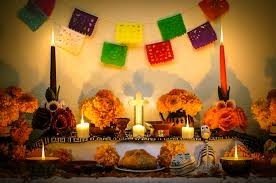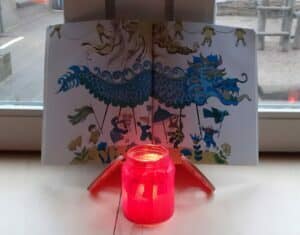Halloween

Halloween is originally a Celtic celebration. In the Celtic calendar, 1 November is the first day of the new year. On 31 October – their New Year's Eve – they would reflect on the fact that the harvest had been brought in and the seeds were ready for the new year.
At this time people would go to the cemeteries to show their gratitude for the harvest, which was as they believed, partly due to the favour of the dead. They made offerings in the form of the gifts of the harvest and decorated the tombs with candles.
The name Halloween comes from All Hallows Eve or All Saints’ Eve – the evening before All Saints' Day on 1 November. All Saints' Day is a Catholic holiday commemorating all saints and martyrs. It was believed that on All Saints' Eve the dead spirits would return among the living and to scare away evil spirits, people wore masks.
The old Celtic traditions have evolved into a new form. Halloween is now a celebration where children dress up, go door-to-door and trick or treat. Houses are decorated with pumpkins and lights. This trick-or-treat tradition originated with poor Christians who used to go to houses on All Souls Day to beg. They begged for food to add more nutrition to their diet and promised to pray for the dead souls.
By going out into the darkness on Halloween and courageously looking for the somewhat shadowy side of life, one dares to look one's own fears in the eye. Dressing up can be fun and exciting. It is better to keep the element of fear outside our door! We can light a candle around these days and reflect on those who have passed away.
Día de los Muertos

Día de los Muertos and Halloween have very different histories and contemporary evolutions. In many Latin American countries, Día de Los Muertos celebrates death in a way that signifies the perpetual cycle of life, viewing death as the beginning of a new life in another realm. In fact, many spiritual traditions believe that during this time of year (in the autumn, or in the month of October), the veil between the spirit realm and the human realm is at its thinnest. Latin cultures thus celebrate Día de los Muertos as a day to commemorate this communion.
One of the ways this is done is through the creation of an altar or ofrenda. The symbolism of the ofrenda is deeply important as it creates a central space for the living and the dead to come together. Traditionally, one might place photos, food or drink items on the altar that the deceased loved ones enjoyed in life – maybe even religious or spiritual symbols too. You might also see sugar skulls on the ofrenda which can symbolise the sweetness of life, and the overall celebratory spirit of the tradition.
Diwali

Diwali is a Hindu festival of light, held in the period from October to November. It is particularly associated with Lakshmi, the goddess of prosperity, and marks the beginning of the year in India. It comes at harvest time, and it unites three different streams of Hindu religions. Families and friends gather in homes brightly lit with oil lamps and candles. Women dress in their finest, most colourful saris and decorate their doorway floors with bright powders in intricate Rangoli designs. Sweets and cakes are freely offered, and gifts are exchanged amid joyous family reunions that culminate in firework displays.
Ramadan

Ramadan is the ninth month in the Islamic calendar, which follows the phases of the moon. Fasting during Ramadan is one of the fundamental pillars of Islam, and Muslims who are old enough and healthy enough to fast, do so for the entire month. Adult Muslims fast from sunrise to sunset without any water or food.
Ramadan is about self-discipline and piety and is supposed to be a time of spiritual recharge. As we get through the day without food or water, it reminds us to be grateful for all our blessings. It is also a time for prayer, introspection, charity, and service. This month is about a lot more than just food!
Ramadan lanterns are the traditional lights used during the month of Ramadan to decorate houses and children are given special lanterns as a gift at the beginning of the month. The lantern is a well-known tradition during Ramadan and the concept of the lanterns originated in ancient Egypt. Shining lanterns everywhere make the month of Ramadan a beautiful time of year.
Chinese New Year

The Spring Festival (the Chinese New Year) is an annual event in China. This massive event takes place on different dates each year, but it typically begins during the beginning of February and continues until the middle of the same month (16 days in total).
Traditions include wearing red clothing and decorating houses with red items. People hang up red lanterns and cut Chinese paper cuttings to decorate their houses. Families come together and eat delicious food, and in the evening, fireworks are set off. Family elders will also often give children money in a red purse or envelope. Xinnian hao! (新年好).
Keti Koti

‘Keti-Koti’ means ‘broken chains’ in the Creole language Sranangtongo, spoken in Surinam. This festival that takes place on 1 July is about celebrating freedom, as it marks the abolition of slavery by The Netherlands in Surinam (Dutch Guyana) and the Dutch Antilles in 1863. It wasn’t until a decade later however, that the slaves were actually freed from their work on the plantations.
As of today, campaigners are calling for a public holiday in The Netherlands to commemorate the end of slavery on this day.
Are you ready to join?
View the Admission Procedure.
Our application process begins with a visit to the school-- or if that's not possible we can schedule a Skype call. Following your visit or call, when you have decided you would like to enroll please notify us by email at info@iwsth.org and we will send you a link to our application form. Please use the contact form below or email at info@iwsth.org to schedule a meeting or Skype call.
About IWSTH
The International Waldorf School of The Hague is a non-profit international primary school with a distinct educational vision. Engagement with societal developments in sustainability, peace, justice and well-being plays a key role in shaping our educational programme.

